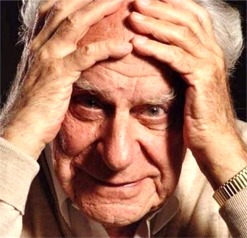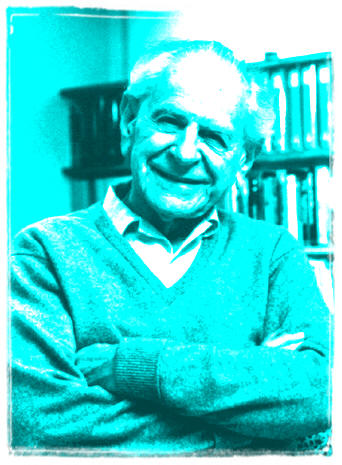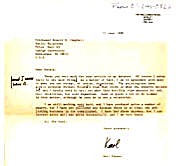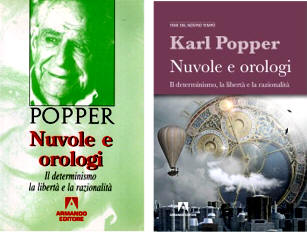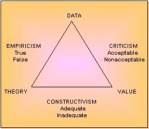|
KARL RAIMUND POPPER ' la vita è scettica ' dal greco skepsis . . . ricerca | ||
| ||
|
La nostra conoscenza può essere solo finita mentre la nostra ignoranza
deve essere necessariamente infinita The more we learn about the world, and the deeper our learning, the more conscious, specific, and articulate will be our knowledge of what we do not know; our knowledge of our ignorance. For this indeed, is the main source of our ignorance - the fact that our knowledge can be only finite, while our ignorance must necessarily be infinite. . La vera ignoranza non è la mancanza di conoscenza ma il rifiuto di acquisirla true ignorance is not the absence of knowledge but the refusal to acquire it
POPPER È una società in cui la politica fa proprio l'atteggiamento razionale della scienza si abbandona l'idea di un mondo perfetto, e si passa alla realizzazione di interventi sempre parziali e limitati, intesi come tentativi sempre fallibili di risolvere problemi particolari della società. Problema della politica deve essere, allora, quello di garantire il controllo di chi governa, e questo è possibile attraverso istituzioni democratiche. Nella società aperta di Popper quindi è importante la connessione tra scienza e Stato per garantire la democrazia, e la scienza è sentita, anche per questo motivo, come un bene irrinunciabile. Razionalismo e Popper In generale, il razionalismo è l'atteggiamento che si fonda sui procedimenti della ragione per determinare credenze o tecniche in un dato campo.
Con Popper viene abbandonata l'idea della
razionalità come ricerca della certezza e come tentativo di giustificare le teorie. Per
Popper, al contrario, l'atteggiamento razionale si basa sulla critica delle teorie. Egli
cerca, infatti, di individuare possibili errori, problemi interni, ossia la 'fallibilità'
delle teorie. Nonostante ciò in lui è riscontrabile un residuo empirista poiché egli sembra ammettere la possibilità di un linguaggio osservativo neutro. I fatti sono ancora importanti in quanto sono in grado di confutare una teoria e, inoltre, occorre ammettere l'esistenza di un linguaggio comune entro cui formulare le argomentazioni.
linguaggioglobale.com
VERITÀ
I am utterly opposed to those who fear truth
who think
it was a sin to eat from the tree of knowledge
letter to donald t. campbell 1988 - ingrandisci
falsificabilità - tedesco Fälschungsmöglichkeit
una teoria per essere controllabile e perciò scientifica deve essere falsificabile
fallibilismo
Popper sostiene il carattere fallibile della
conoscenza umana e la sua possibilità di progredire attraverso la
critica: per questo aspetto la sua concezione è denominata fallibilismo . Egli interpreta
l'aggettivo critico come sinonimo di razionale; dai primi
pensatori greci, i cosiddetti presocratici, la civiltà
occidentale avrebbe ereditato, a suo avviso, la tradizione
razionalistica , la quale consiste nella discussione critica
delle teorie via via avanzate per risolvere i problemi,
nell'intento della ricerca della verità. www.filosofico.net/popper7.htm
provare e riprovare La scienza moderna non è quella che crede che il Nuovo abbia sempre ragione. Al contrario si fonda sul principio del ' fallibilismo'Ma la scienza moderna non è quella che crede che il Nuovo abbia sempre ragione. Al contrario, si fonda sul principio del 'fallibilismo' (già enunciato da Peirce, ripreso da Popper e da tanti altri teorici, e messo in pratica dai pratici) per cui la scienza procede correggendo continuamente se stessa, falsificando le sue ipotesi, per 'trial and error' (tentativo ed errore), ammettendo i propri sbagli e considerando che un esperimento andato a male non sia un fallimento, ma valga tanto quanto un esperimento andato bene, perché prova che una certa via che si stava battendo era sbagliata e bisogna o correggere o addirittura ricominciare da capo. Che è poi quello che sosteneva secoli fa l'Accademia del Cimento, il cui motto era 'provando e riprovando' - e 'riprovare' non significava provare di nuovo, che sarebbe il meno, ma respingere (nel senso della riprovazione) quello che non poteva essere sostenuto alla luce della ragionevolezza e dell'esperienza. http://espresso.repubblica.it
falsifiability - falliblism
sentences are said to be synthetically true or false.
sentences are said to be analytically true or false.
I was, and still am, an empiricist of
sorts, though certainly not a naive empiricist, who believes that
all knowledge stems from our perception or sense data.
My empiricism consisted in the view that, though
all experience was theory-impregnated, it was experience which in the end could
decide the fate of a theory, by knocking it out; and also in the view that only
such theories which in principle were capable of being thus refuted merited to
be counted among the theories of empirical science.
THUS ETHICAL PRINCIPLES FORM THE
BASIS OF SCIENCE All men and all women are philosophers
If they are not conscious of
having philosophical problems, they have, at any rate, philosophical
prejudices. Most of these are theories which they take for granted: they
have absorbed them from their intellectual environment or from tradition. But the approach to truth is not easy
There is only one way towards it, the way through error. Only through our
errors can we learn; and only he will learn who is ready to appreciate and
even to cherish the errors of others as stepping stones towards truth, and
who searches for his own errors: who tries to find them, since only when
he has become aware of them can he free himself from them. ... It might do us good to remember from time to time that, while differing widely in the various little bits we know, in our infinite ignorance we are all equal. ... In science, a mistake we make - an error
consists essentially in our
regarding as true a theory that is not true. (Much more rarely, it
consists in our taking a theory to be false, although it is true.) To
combat the mistake, the error, means therefore to search for objective
truth and to do everything possible to discover and eliminate falsehoods.
This is the task of scientific activity. Hence we can say: our aim as
scientists is objective truth; more truth, more interesting truth, more
intelligible truth. We cannot reasonably aim at certainty. Once we realize
that human knowledge is fallible, we realize also that we can never be
completely certain that we have not made a mistake. This might also be put
as follows: ... Knowledge consists in the search for truth
the search for objectively true, explanatory
theories . It is not the search for certainty .
To err is human . All human
knowledge is fallible and therefore uncertain .
The question is not 'Who should rule' or 'Who
is to have the power?' but 'How much power should be granted to the
government?' or perhaps more precisely 'How can we develop our political
institutions in such a manner that even incompetent and dishonest rulers
cannot do too much harm?' In other words, the fundamental problem of
political theory is the problem of checks and balances, of institutions by
which political power, its arbitrariness and its abuse can be controlled
and tamed. Or take a different example of a philosophical prejudice
There is the prejudice that a man’s opinions
are always determined by his self-interest. This doctrine (which may be
described as a degenerate form of Hume’s doctrine that reason is, and
ought to be, the slave of the passions) is not as a rule applied to
oneself (this was done by Hume, who taught modesty and skepticism with
respect to our powers of reason, his own included), but it is as a rule
only applied to the other fellow—whose opinion differs from our own. It
prevents us from listening patiently, and from taking seriously opinions
which are opposed to our own, because we explain them by the other
fellow’s interests. But this makes rational discussion impossible. It
leads to a deterioration of our natural curiosity, our interest in finding
out the truth about things. In place of the important question “What is
the truth about this matter?” it puts the less important question “What is
your self-interest, what are your motives?” It prevents us from learning
from people whose opinions differ from our own, and it leads to a
dissolution of the unity of mankind, a unity that is based on our common
rationality. .
by 'fallibilism' I mean here the view, or the
acceptance of the fact, that we may err, and that the quest for certainty
(or even the quest for high probability) is a mistaken quest.
But this does not imply that the quest for truth is mistaken.
On the contrary, the idea of error implies that of truth as the standard
of which we may fall short. It implies that,
though we may seek for truth, and though we may even find truth (as I
believe we do in very many cases), we can never be quite certain that we
have found it. There is always a possibility of
error; though in the case of some logical and mathematical proofs, this
possibility may be considered slight.
fb/kp
determinismo /
indeterminismo
Il determinismo è, sostanzialmente, la teoria per la quale tutto ciò che accade nel mondo, si svolge come in un ideale meccanismo ad orologeria. Contrariamente a ciò, io credo che gli sviluppi degli eventi nel mondo non siano predeterminati. I miei argomenti principali sono, in sostanza, le invenzioni umane. Mi pare abbastanza chiaro che nella nebulosa primitiva – bilioni di anni fa – un auto o un aereo o cose del genere non erano già predeterminate o precostituite, ma che esse sono venute nel mondo fisico solo ad opera dello spirito umano.
NUVOLE E OROLOGI personalmente, ritengo che
la dottrina dell'indeterminismo sia vera e che il determinismo sia privo
di qualsiasi fondamento.
conjectures and refutations La teoria sobre el mètode científic
de Popper, basada en la seva concepció de la ciència com a
sistema de
conjectures i refutacions, segons la qual una hipòtesi o teoria
científica és un enunciat universal, la veritat del qual no pot demostrar-se,
perquè cap sèrie finita d'observacions -cap procediment inductiu- pot establir
la confirmació d'una hipòtesi, però la falsedat de la qual sí que pot
determinar-se, mitjançant la refutació o falsació d'aquesta. Imre Lakatos,
filòsof hongarès, seguidor de les idees de Popper, distingeix entre un
falsacionisme dogmàtic i un falsacionisme metodològic.
How can we admit that our knowledge is a human--an all
too human--affair, without at the same time implying that it is all individual
whim and arbitrariness ?
the liberal does not dream
of a perfect consensus of opinion; he only hopes for the mutual
fertilization of opinions, and the consequent growth of ideas.
even when we solve a problem to universal satisfaction, we create, in
solving it, many new problems over which we are bound to disagree.
this is not to be regretted. simply because the so-called 'nations’ or 'peoples' of which the nationalists dream do not exist. There are no, or hardly any, homogenous ethnic groups long settled in countries with natural borders. Ethnic and linguistic groups (dialects often amount to linguistic barriers) are closely intermingled everywhere.
the history of our time : an optimist's view -
1956 LA GUERRA DELLE IDEE The war of ideas is a Greek invention.
It is one of the most important inventions ever made.
Indeed, the possibility of fighting with with
words and ideas instead of fighting with swords is the very basis of our
civilization, and especially of all its legal and parliamentary institutions. UTOPIA AND VIOLENCE We can see here that the problem of the true and the false rationalisms - Utopianism - is part of a larger problem. Ultimately it is the problem of a sane attitude towards our own existence and its limitations–that very problem of which so much is made now by those who call themselves ‘Existentialists’ the expounders of a new theology without God. There is, I believe, a neurotic and even an hysterical element in this exaggerated emphasis upon the fundamental loneliness of man in a godless world, and upon the resulting tension between the self and the world. I have little doubt that this hysteria is closely akin to Utopian romanticism, and also to the ethic of hero-worship, to an ethic that can comprehend life only in terms of ‘dominate or prostrate yourself’. And I do not doubt that this hysteria is the secret of its strong appeal .chapter 18 - utopia and violence of conjectures and refutations There is no scientific way of choosing between two ends. Some people, for example, love and venerate violence. For them a life without violence would be shallow and trivial. Many others, of whom I am one, hate violence. This is a quarrel about ends. It cannot be decided by science. This does not mean that the attempt to argue against violence is necessarily a waste of time. It only means that you may not be able to argue with the admirer of violence. He has a way of answering an argument with a bullet if he is not kept under control by the threat of counter-violence ....
Work for the elimination of concrete evils
rather than for the realization of abstract goods. Do not aim at
establishing happiness by political means. Rather aim at the elimination
of concrete miseries. Or, in more practical terms: fight for the
elimination of poverty by direct means--for example, by making sure that
everybody has a minimum income. Or fight against epidemics and disease by
erecting hospitals and schools of medicine. Fight illiteracy as you fight
criminality. But do all this by direct means. Choose what you consider the
most urgent evil of the society in which you live, and try patiently to
convince people that we can get rid of it.
...
What we should do, I suggest, is to give up the
idea of ultimate sources of knowledge, and
admit that all knowledge is human;
that it is mixed with our errors, our prejudices, our dreams, and our
hopes; that all we can do is to grope for truth even though it be beyond
our reach. We may admit that our groping is often inspired, but we must be
on our guard against the belief, however deeply felt, that our inspiration
carries any authority, divine or otherwise. If we thus admit that there is
no authority beyond the reach of criticism to be found within the whole
province of our knowledge, however far it may have penetrated into the
unknown, then we can retain, without danger, the idea that truth is beyond
human authority . And we
must retain it . For without
this idea there can be no objective standards of inquiry; no criticism of
our conjectures; no groping for the unknown; no quest for knowledge .
It is often asserted that discussion is only possible
between people who have a common language and accept common basic assumptions. I
think that this is a mistake. All that is
needed is a readiness to learn from one's partner
in the discussion which
includes a genuine wish to understand what he intends to say.
If this readiness is there, the discussion will be the more fruitful the
more the partner's backgrounds differ .
The more we learn about the world, and the deeper our learning, the more conscious, specific, and articulate will be our knowledge of what we do not know; our knowledge of our ignorance. For this indeed, is the main source of our ignorance - the fact that our knowledge can be only finite, while our ignorance must necessarily be infinite. ... What we should do, I suggest, is to give up the idea of ultimate sources of knowledge, and admit that all knowledge is human; that it is mixed with our errors, our prejudices, our dreams, and our hopes; that all we can do is to grope for truth even though it be beyond our reach . ... From the point of view here developed all laws, all theories, remain essentially tentative, or conjectural, or hypothetical, even when we feel unable to doubt them any longer. Before a theory has been refuted we can never know in what way it may have to be modified. That the sun will always rise and set within twenty-four hours is still proverbial as a law 'established by induction beyond reasonable doubt'. It is odd that this example is still in use, though it may have served well enough in the days of Aristotle and Pytheas of Massalia - the great traveller who for centuries was called a liar because of his tales of Thule, the land of the frozen sea and the midnight sun .
.
l'intelligenza è utile per la sopravvivenza se ci permette di estinguere una cattiva idea prima che la cattiva idea estingua noi
the natural sciences are represented by the left hand side of the triangle
The natural sciences are represented by the left hand side of the triangle, where data sentences are compared with theory sentences. If dissonance occurs between the two, Popper's falsification principle (1972) will give priority to the data sentence, so that for consonance to happen the theory will have to be modified. Scientific criticism, at the right hand side of the triangle, confronts data sentences with value sentences. In the case of dissonance, the validity of both sentences may be subjected to discussion. Irrational arguments are then likely to be involved. Constructivism, at the base of the triangle, implies comparing theory sentences with value sentences, to determine to which extent the foreseen world is also the preferred world. This is also an area where irrationality is involved. In the case of dissonance, both sentences are given the same priority, that is, it may be necessary to change both. newmedia.no I think there is only one way to do science – or to do philosophy for that matter to meet a problem, to see its beauty and fall in love with it; to get married to it, and to live with it happily, till death do ye part - unless you should meet another and even more fascinating problem, or unless indeed you should obtain a solution. But even if you do obtain a solution you may then discover to your delight, the existence of a whole family of enchanting though perhaps difficult problem children for whose welfare you may work, with a purpose to the end of your days. Karl Popper
se le leggi fisiche di questo mondo sono indipendenti da noi noi non siamo liberi
se siamo liberi allora non sono indipendenti
POPPER E LA TRADIZIONE
ANTIMETAFISICA . .
I do not believe in the current theory that in
order to make an argument fruitful, the arguers must have a great deal in
common. . Il problema della pace perpetua nel mondo secondo gli storicisti i fatti accidentali anche quando si verificano non influenzano comunque la direzione fondamentale della storia. Vero. Ma contro questo determinismo si potrebbe obiettare che gli eventi accidentali sono talvolta complessi e importanti, anche se, naturalmente, il loro peso è maggiore nelle società più piccole. Cosa intendo infatti per "eventi accidentali"? Ad esempio, quel che capitò nella guerra del Peloponneso tra Atene e Sparta, un episodio storico le cui conseguenze avvertiamo ancora oggi, poiché l'esito di quella guerra cambiò il destino della democrazia in Grecia. Ebbene, l'andamento della guerra del Peloponneso risentì certamente dell'accidentale scoppio della peste in Atene. Durante l'assedio la peste uccise Pericle, il faro politico ateniese, sicché, da quel momento, la città rimase senza una guida davvero forte. A questo proposito, vorrei ricordare un libro molto interessante: Ratti, pidocchi e storia, che, attraverso la storia del tifo, illustra quale forza tremenda le malattie abbiano sempre avuto sul corso degli avvenimenti. david miller - unita - tellusfolio Ora sappiamo quali sono le priorità fondamentali che lei
vorrebbe stessero in testa all’agenda politica. Si tratta di punti – la pace,
l’arresto dell’esplosione demografica, l’educazione alla nonviolenza – che
richiedono la cooperazione di tutti senza distinzioni di parte. Queste
indicazioni secondo lei sono di destra o di sinistra? Quelle priorità indicano qualcosa che potrebbe prendere
il posto della distinzione destra-sinistra. Vale a
dire che noi dobbiamo pensare a quali fatti sono necessari per realizzare quegli
obiettivi (…) Dovremmo insomma soppiantare questo orribile sistema dei partiti,
in base al quale la gente che sta in questo momento nei nostri Parlamenti è
prima di tutto dipendente da un partito, e solo in seconda istanza sta per usare
il proprio cervello per il bene della popolazione che rappresenta. La mia
opinione è che questo sistema deve essere sostituito e che noi dobbiamo tornare,
se possibile, ad uno Stato in cui gli eletti vadano in Parlamento e dicano:
io sono il vostro rappresentante e non appartengo a nessun partito.
I remained a socialist for several years even after my
rejection of Marxism and if there could be such a
thing as socialism combined with individual liberty, I would be a socialist
still. For nothing could be
better than living a modest, simple and free life in an egalitarian society.
It took some time before I recognized this as no more than a
beautiful dream; that freedom is more
important than equality; that the
attempt to realize equality endangers freedom;
and that if freedom is lost there will not even be equality among the
unfree.
Karl Raimund Popper appartiene a quella schiera di autori con i quali - dopo averli studiati - si impara a convivere e per i quali non si può fare a meno
di provare
una profonda riconoscenza intellettuale
fb/kp
Appendix IV -
Misreading Popper : The
Top Ten Errors This guide, the first in the Popular Popper series, provides an introduction to "The Logic of Scientific Discovery" - a book which changed the direction of the philosophy of science in the 20th century. The guide proposes that Popper's ideas are best understood as a number of "turns" which he introduced. These include the "conjectural" turn to acknowledge that even our best scientific theories may be false and the "conventional" or "rules of the game" turn to account for the social nature of science and allow for the revival of metaphysics within any scientific research program. It also lists the most common misunderstandings of Popper which have confused students of philosophy and diminished his standing in academic circles . amazon In point of fact, no conclusive disproof of a theory can ever be produced; for it is always possible to say that the experimental results are not reliable, or that the discrepancies which are asserted to exist between the experimental results and the theory are only apparent and that they will disappear with the advance of our understanding . the logic of scientific discovery .
We must be clear in our own minds that we need other people to discover and correct our mistakes - as they need us - especially those people who have grown up with different ideas
in a different environment.
Abbiamo bisogno della libertà per impedire che lo Stato abusi del suo potere ed abbiamo bisogno dello Stato per impedire l'abuso della libertà
| ||
|
in che cosa consiste fondamentalmente un modo di comportarsi “ civilizzato ” ? Consiste nel ridurre la violenza È questa la funzione principale della civilizzazione ed è questo lo scopo dei nostri tentativi di migliorare il livello di civiltà delle nostre società
il prezzo della libertA E
l’eterna vigilanza
| ||
|
welcome popper - pagina 1 - 2
links www.tkpw.net/intro_popper/intro_popper
http://biografieonline.it/biografia.Karl+Popper
https://sociologicamente.it/storia-del-tacchino-induttivista
http://plato.stanford.edu/entries/popper www.studenti.it/riassunto-pensiero-filosofico-karl-popper https://youtu.be/rg8yLS7USFI - philosophy against false prophets - 1974
altri autori
|
